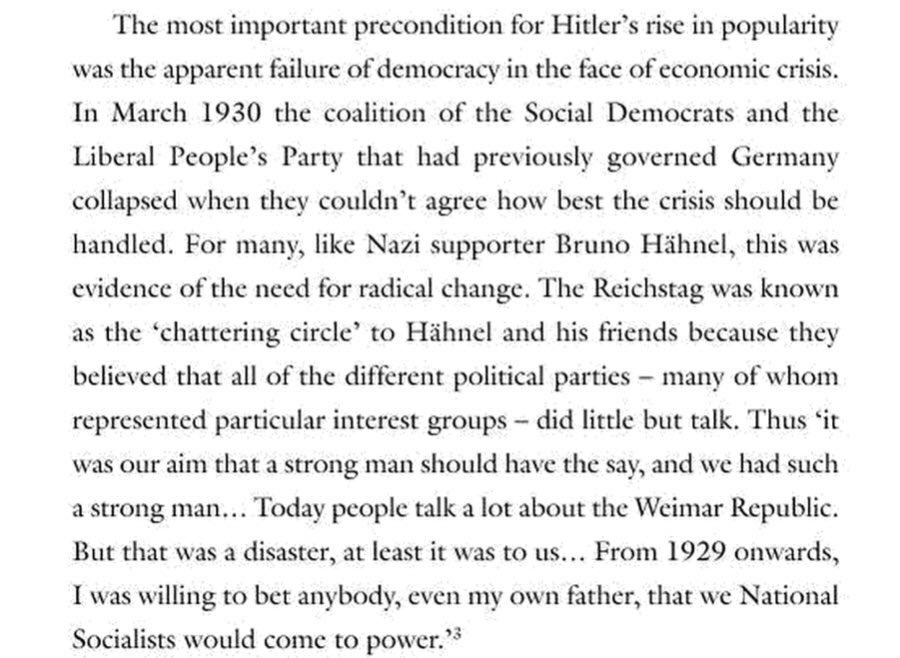- Timeline
- Who voted for Hitler
- Hitler’s Personality
- Economy and the Great Depression
- Conservatives
- Perspectives and Historiography
- Student Arguments
1.Timeline
1914-18 Corporal in the German Army, decorated with the Iron Cross as a runner/messenger. Germany sign the Armistice 11/11/18.
1919 Became a member of the German Workers Party (DAP). Treaty of Versailles signed.
1920 DAP renamed National Socialists German Workers Party (NSDAP). Hitler became leader in 1921. Twenty-five point programme announced.
1923 Munich Putsch
1924 Hitler in Landsberg Prison where he wrote Mein Kampf
1925 Hitler agreed to obey German law and aim to take power democratically.
1928 The May election saw the Nazis achieve only 2.6% of the vote.
1932 July election saw the Nazis taking the most votes, 37.3%.
1932 The November election saw their vote decline to 33.1%
1933 Hitler becomes chancellor in January.
1933 February, the Reichstag burns down. Hitler persuades Hindenburg to pass the Reichstag Fire Decree.
1933 March, the first concentration camp at Dachau opens. Election sees their vote increase to 43.9% and the Enabling Act is also passed.
2.Who voted for Hitler
Look at the following map from Brilliantmaps.com. What does it show you about who voted for Hitler? Can you work out why?
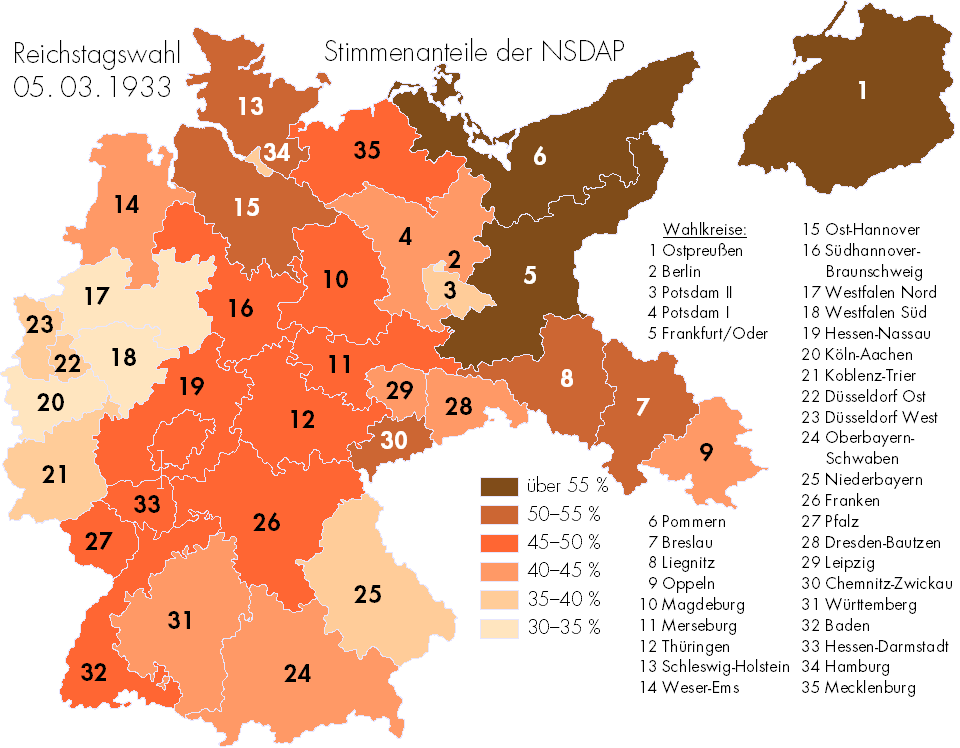
Why did the nazis hijack the Swastika?
3. Hitler’s Personality
Hitler and Stalin’s utopian dreams
Women
4. Economy and the Great Depression
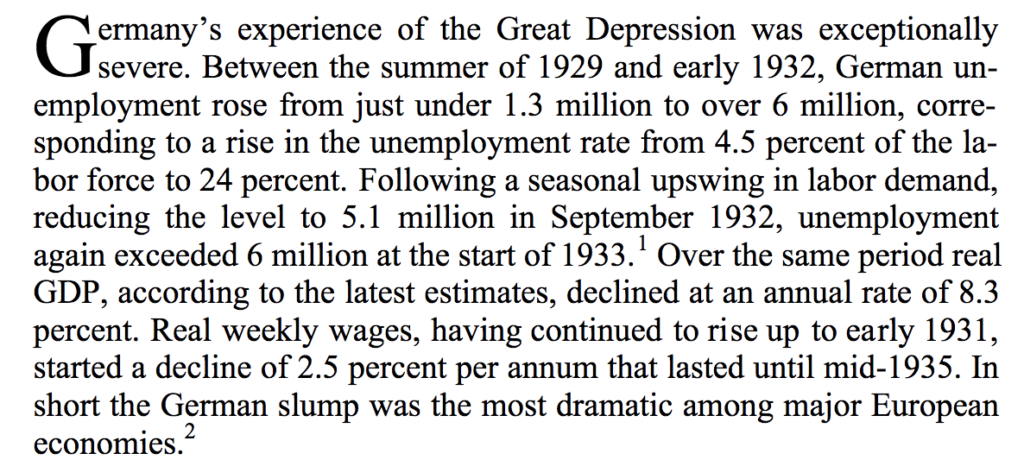
Austerity helped Hitler and the Nazis into power.
Nazi social and economic policies
‘Germany’s financial crisis precipitated the collapse of the Weimar Republic with frightening speed.’ Analysis of Historian Tobias Straumann.
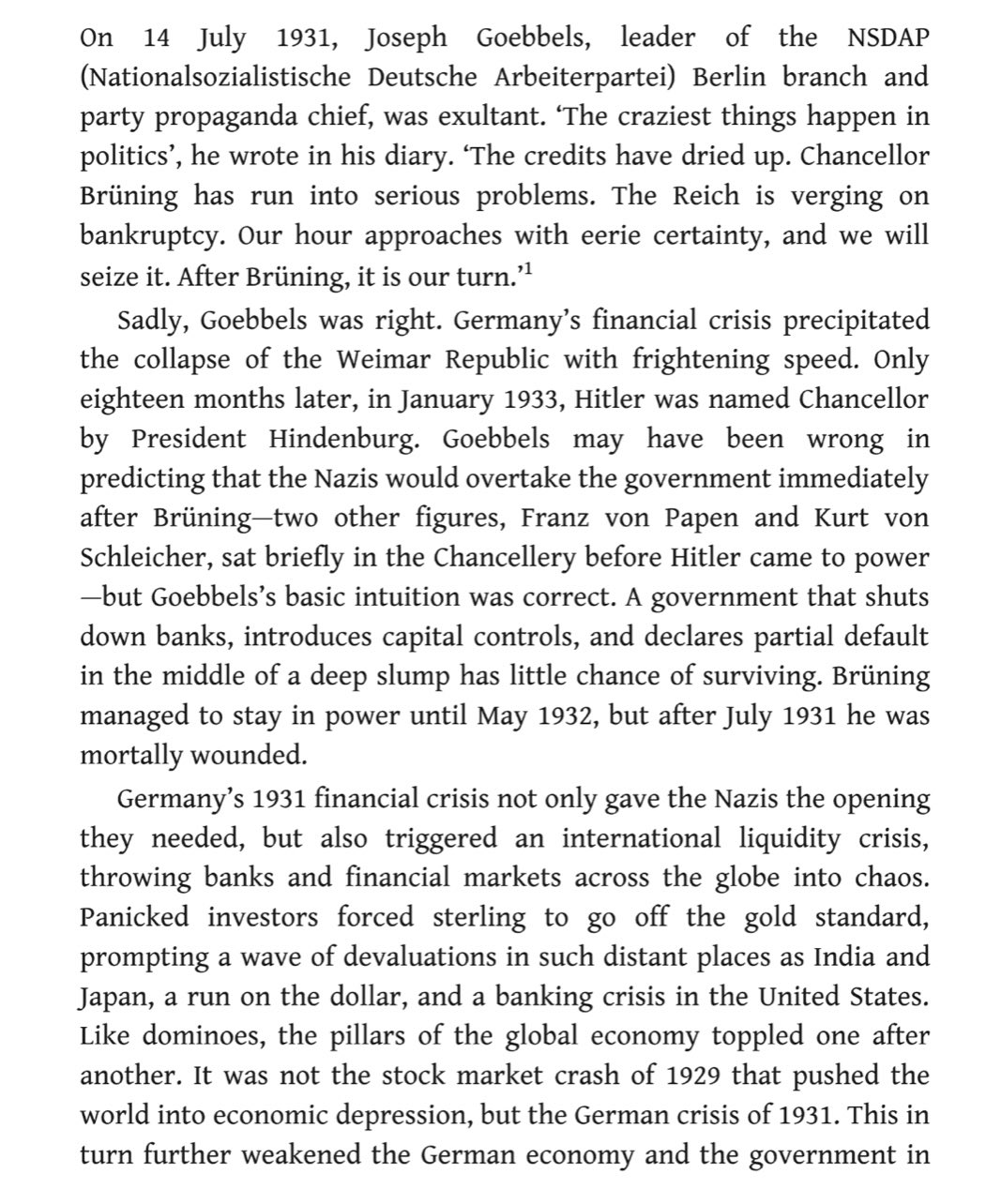
MEFO Bills
5. Conservatives
The Social Democrats were clearly against Hitler becoming president. The following was published in their newspaper,

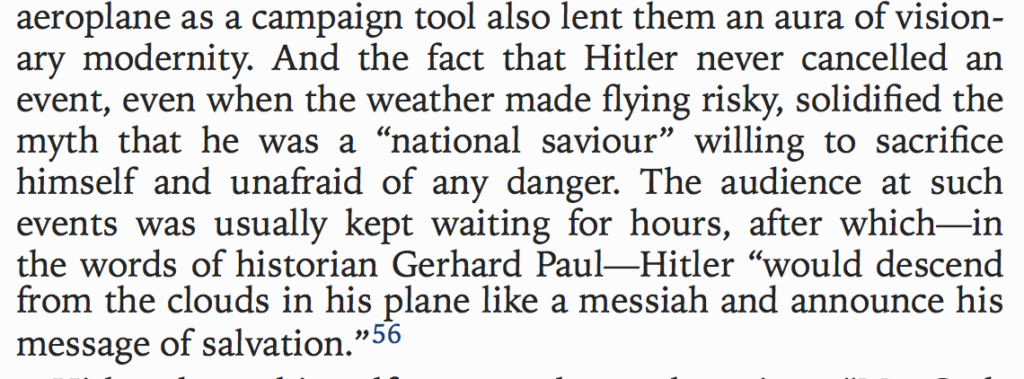
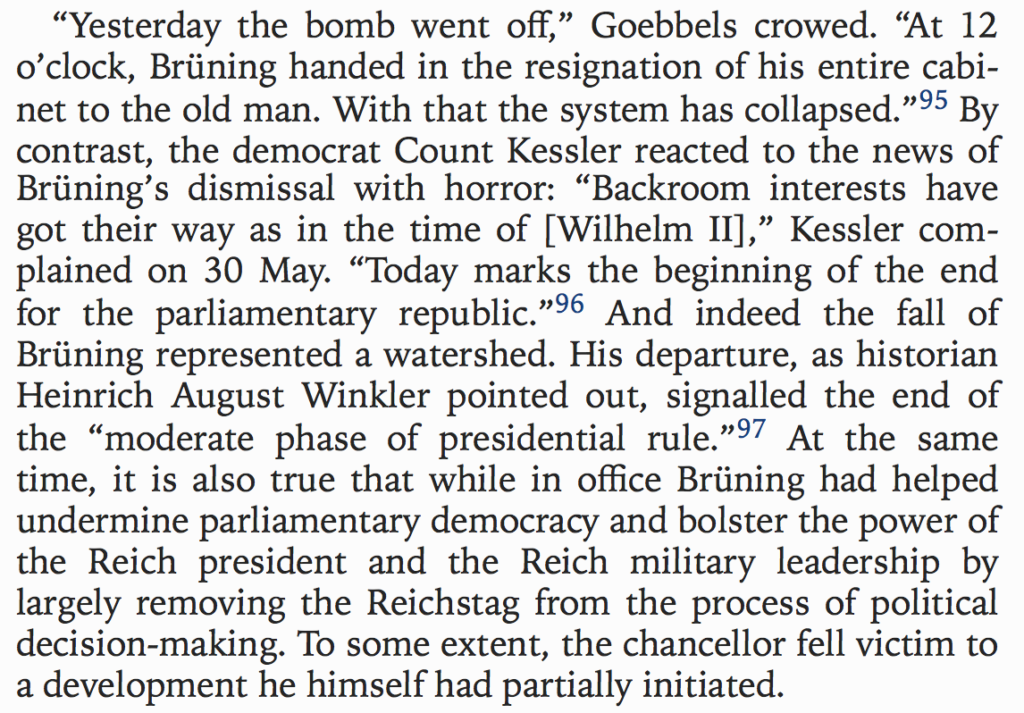
6. Perspectives and Historiography
Marxist historians may argue that Hitler became Chancellor because he had the support of the middle and upper classes.
Intentionalists may argue that Hitler’s plans to abolish the Treaty of Versailles and restore the military enabled him to come to power.
Functionalists would argue that German society brought him to power because of the problems (especially economic) they faced.
German Conservative historians may argue that the people had had enough of the liberal forces which had changed Europe since the French Revolution and preferred a more traditional, authoritarian leader.
You can also argue whether the reasons for Hitler’s rise to power was economic, political, military or social.
Studies after the Second World War ended focused on the fanatic that was Hitler. By the 1960s, reason overruled emotion and more objective studies were being published. Most historians subscribe to the functionalist or structuralist theory where German society was at fault for installing Hitler as the leader. Nationalist supporters in Germany, then and possibly even now would subscribe to the Great Man theory (Kershaw uses ‘superman’) – it was inevitable he would take power because of his charisma, political ability, and foresight (this is the intentionalist argument).
In the 1960s, William Shirer wrote in The Rise and Fall of the Third Reich that Hitler inevitably rose to power within Germany. The rising nationalism and desire for authoritarian rulers from the late-19th century led to Hitler taking power in 1933. Shirer had lived in Europe during the 1930s and 1940s.
Fritz Fischer (also useful to research for the causation of the First World War) believed that the German society was aristocratic and never fully subscribed to the foreign version of democracy. This was the Sonderweg theory – glorifying the military, obedience to rulers and pride (or arrogance) in German culture. Evidence for this is Hitler being given a light sentence for the Munich Putsch, the appointment by Hindenburg as Chancellor in 1933, and given support from other right-wing parties. However, the evidence against this theory is that Hitler was not respected by the Junkers as he was merely the Bohemian Corporal (he was a low-ranking soldier in the First World War) and opposition continued to come from the army.
One of AJP Taylor‘s most famous quotes reflects his own functionalist view: “it was no more a mistake for the German people to end up with Hitler than it is an accident when a river flows into the sea.”
In the 1970s, revisionist historians such as David Irving in Hitler’s War argued that Hitler had been treated badly by history. He was a product in German society who demanded an authoritarian leader to solve their problems.
In the 1990s, Ian Kershaw argued that Hitler came to power because of the nature of German society at that time. He argued that Hitler and the Nazis took full advantage of the power ‘handed’ to them in 1933. The propaganda was used to build on the ‘superman’ image of Hitler.
The following extract is taken from Ian Kershaw’s Hitler.
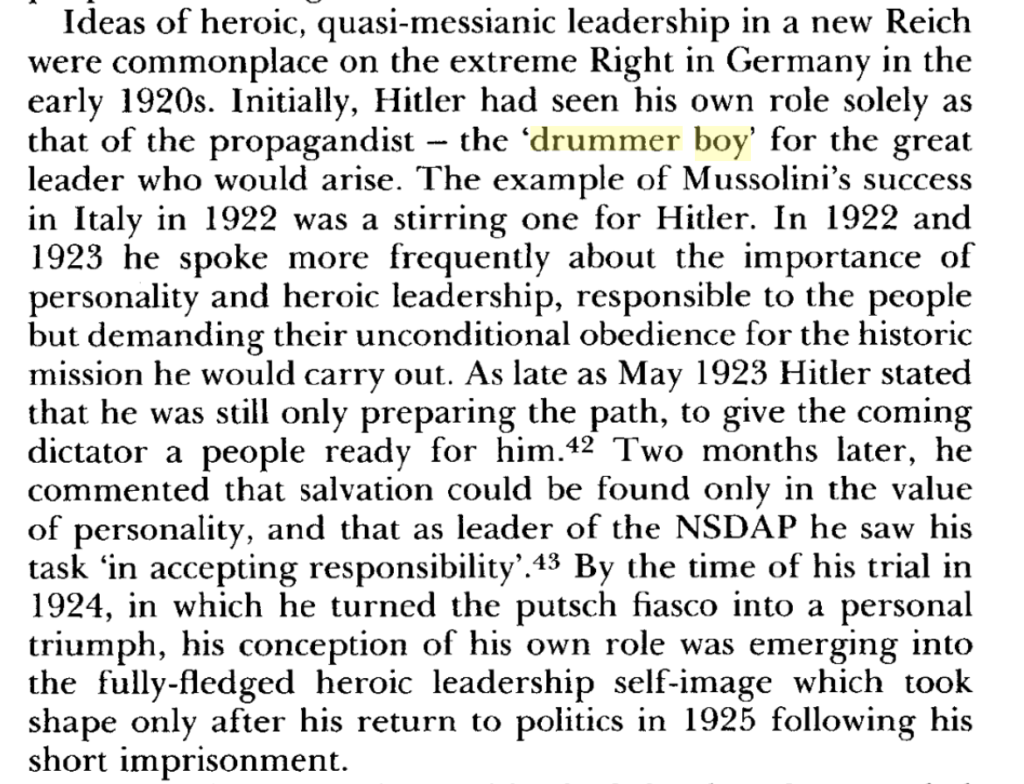
Richard Evans argues that the Nazis did not seize power but won it legally and with consent.
He argues that the use of Article 48 (rule by presidential decree) by Hitler was nothing new to the Weimar Republic. President Ebert had used it 125 times between 1918 and 1925 and Presidents Hindenburg used it, predominantly after 1929. Furthermore, the German parliament ceased to function the more Hindenburg and his Chancellor Brüning used Article 48. Further evidence that Germany had ceased to become a democracy was that the Reichstag met one-hundred days a year from 1920 to 1930, twenty-four days from 1930 to 1932 and only three until February 1933.
Hitler’s Enabling Act bypassed the German constitution and the Reichstag. This was not a new strategy to President Hindenburg and von Papen, they had tried to establish this in 1932 as a way to keep the NSDAP from power. Professor Eberhard Kolb, 1997.
Volker Ullrich argues in ‘Hitler, Ascent‘ that he was a gambler and an actor. At each stage, as leader of the NSDAP, he would gamble all or nothing to achieve power. For example, he was offered the vice-chancellorship of Germany but turned it down, gambling that if he waited for the right opportunity he would get the top position. Furthermore, as an actor, he could be charismatic to an audience if he needed to be or authoritarian when the circumstances required him to be. In this way, he could manipulate others to support or obey him.
J.S. Conway stated that there was no seizure of power by the Nazis in 1933, he was handed it by Hindenburg. But after the Second World War had ended the German people promulgated the theory that they took power, a coup d’etat, to absolve themselves of any guilt. To argue against this is to show the evidence of the Munich Putsch and Hitler’s dismissal of democracy. Moreover, his 25-point plan and the promises contained in Mein Kampf were sufficient to warn the people of his view of leadership.
The following are sections from J.S. Conway’s Machtergreifung or Due Process of History: The Historiography of Hitler’s Rise to Power, 1965.



7. Student Arguments
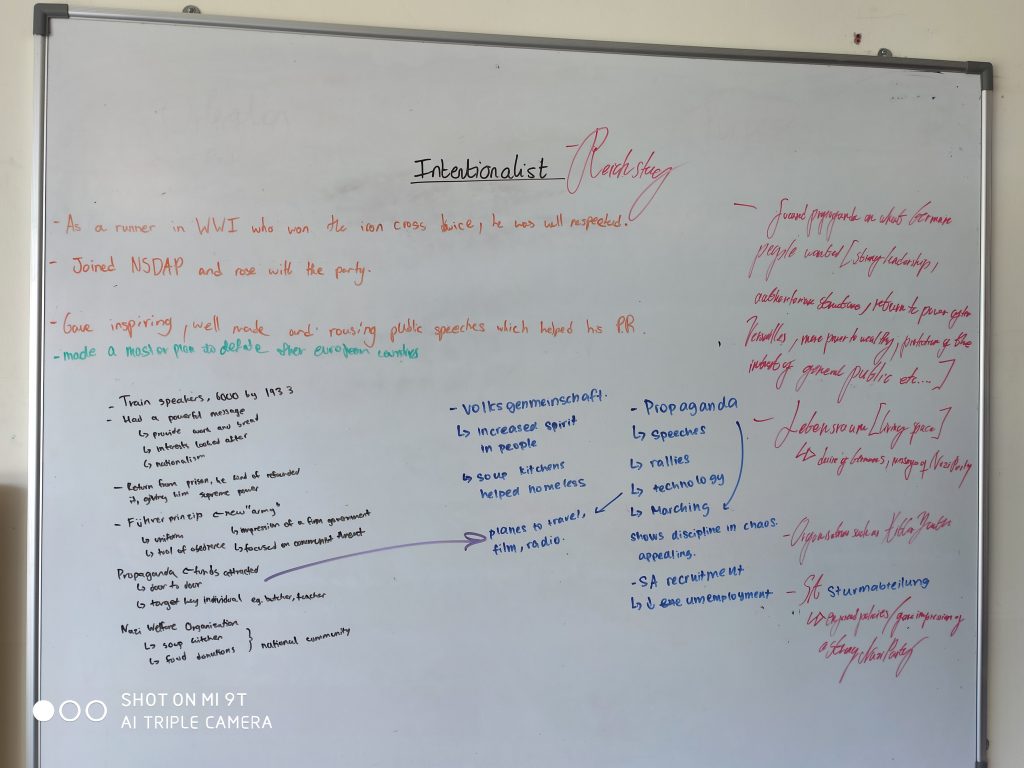
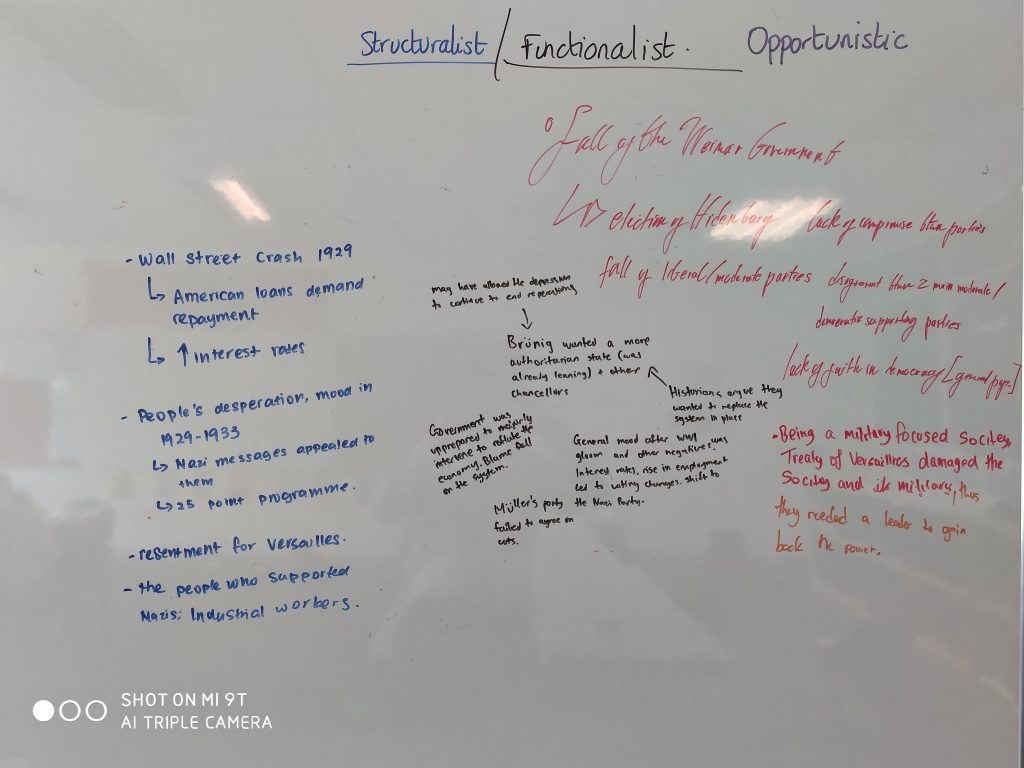
Essay 1

Essay 2
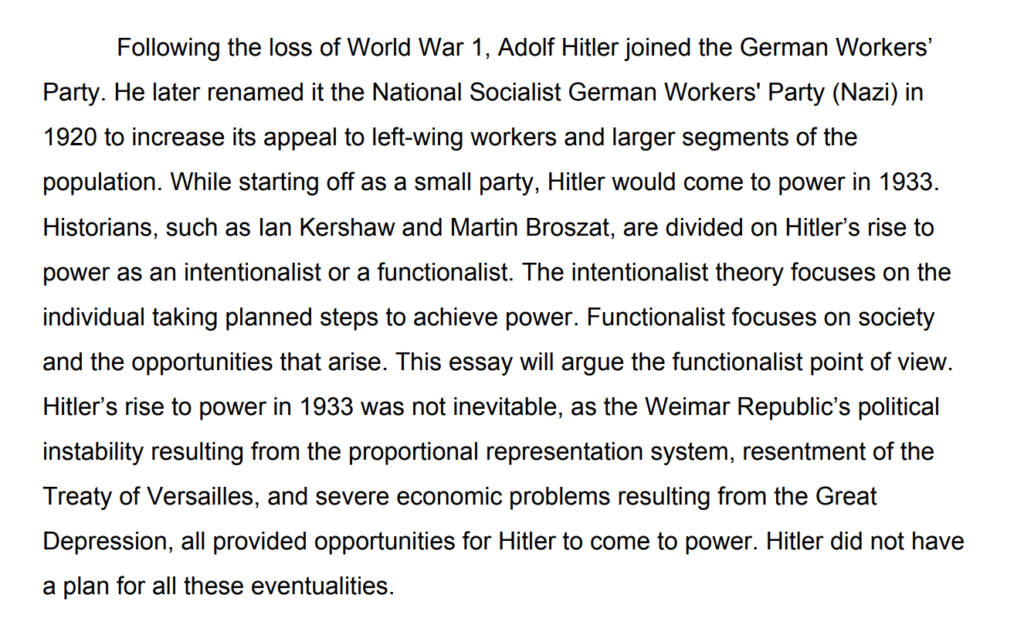
Essay 3
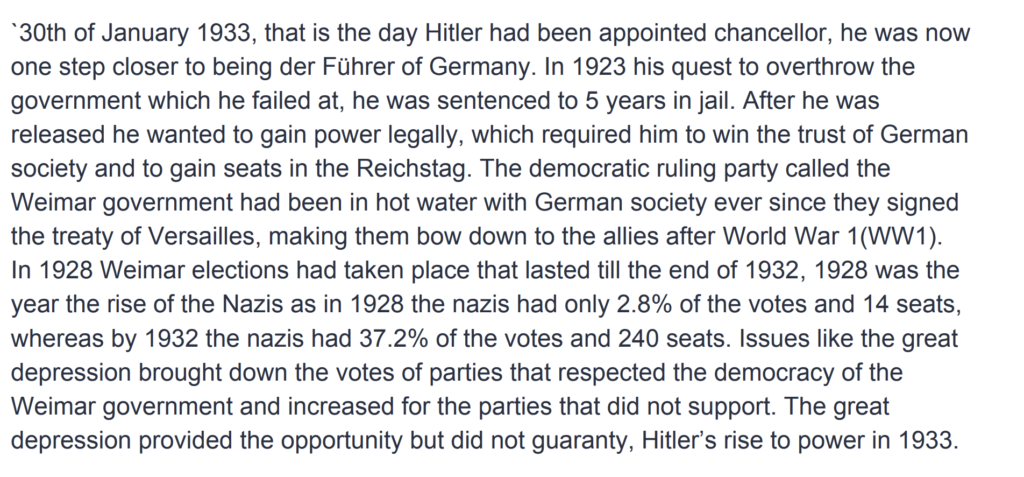
Essay 4



